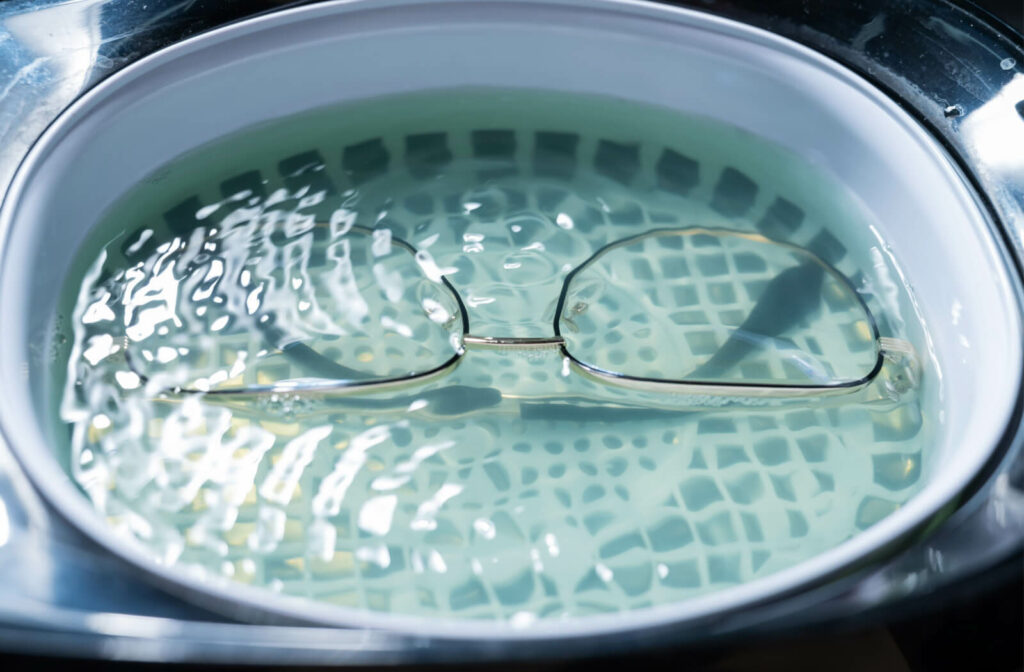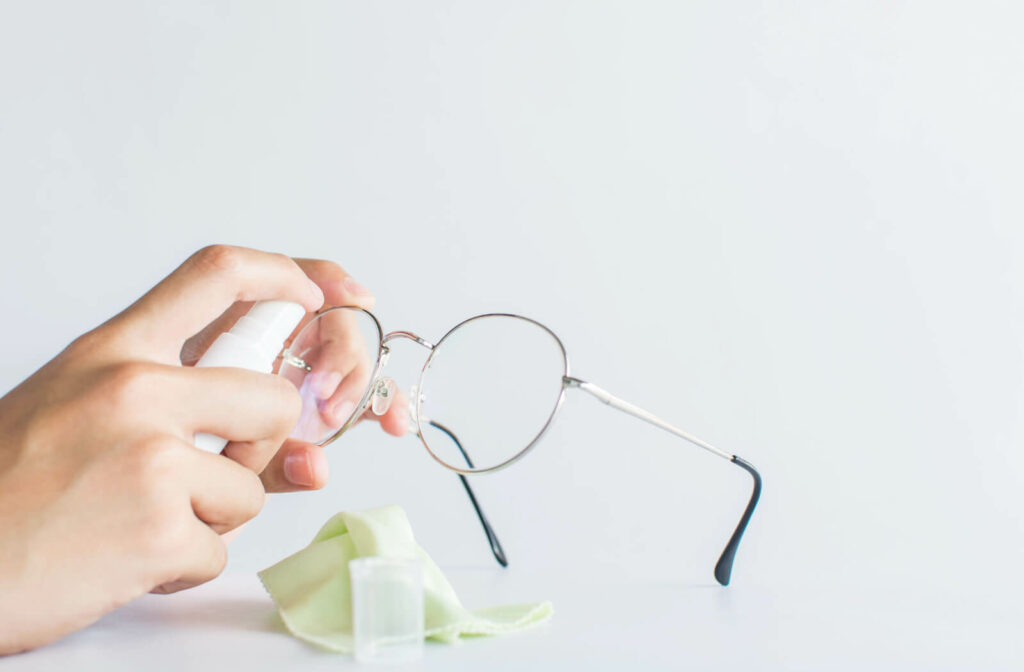Keeping your eyeglasses clean is an important part of caring for your eye health. If you wear glasses most days, you probably also know the inconvenience of dirty lenses.
When lenses are smudged or dirty, it can cause your eyes to work harder, leading to the possibility of eye strain, especially if you’re using a digital screen. On top of the inconvenience of dirty lenses, when your glasses aren’t cleaned, bacteria can build up and put you at risk for possible eye infection or disease.
Cloudy eyeglasses can be cleaned using warm water, a microfiber cloth, and a suitable cleaning solution. Cleaning sprays designed for glasses work wonderfully, but dish soap can be used as well.
Both lenses and frames should be cleaned regularly to help maintain a clean, germ-free pair of glasses you can wear comfortably every day.
Cleaning Your Lenses
To keep your lenses clean and clear, you may want to wipe them down daily, or as often as you wear them. Before cleaning your lenses, you’ll want to wash your hands thoroughly to ensure no smudges occur during the cleaning process.
Begin by rinsing them under lukewarm water to remove any dust or debris clinging to the lenses. The material used to wipe them down is just as important as the cleaning solution, as seemingly soft materials can have coarse fibers that can create tiny scratches on your lenses. Using a microfiber cloth, wipe down your lenses before spraying them with a cleaning solution.
If you prefer to use soap or it’s all you have on hand, choose a lotion-free soap to avoid smudging. Dish soaps can work well for this. Drop a small amount of dish soap on each side of your lenses and gently rub to clean them. Rinse and wipe the lenses once more with your microfiber cloth to reveal a clear, clean surface.
Cleaning Your Frames
While obvious smudges on lenses present an immediate signal that your glasses are dirty, it’s important to keep in mind the bacteria that can build up on frames as well.
Your frames are in direct contact with your skin on a daily basis, so keeping the nose pads and earpieces clean is an important practice in personal hygiene. Your frames may not need to be cleaned as often as your lenses, but it’s a good habit to clean them at least once per week.
To clean your frames, follow a similar set of steps to cleaning your lenses. Begin by running your frames under lukewarm water. Then, using mild soap and your hands, wipe down the frames before rinsing them again.
After drying your frames with a microfiber cloth, use a disinfectant wipe to clean away any bacteria, focusing particularly on the nose pads and earpieces that touch your face.

What to Avoid
When cleaning your lenses or frames, you’ll want to avoid any coarse materials that can scratch and erode your glasses over time.
“Soft” Materials like Clothing, Tissues, and Paper Towels
Many people assume tissues or paper towels are safe for cleaning their lenses or choose to use clothing out of convenience.
While these may be easier to reach for, clothing, tissues, and paper towels have coarse fibers in them that can harm your glasses. Over time, you may notice small scratches or even lose some clarity in your lenses if they are consistently cleaned with these materials.
Acetone
Acetone is dangerous for lenses and frames and can erode the materials quickly if left sitting or used to wipe them down. Stay away from nail polish removers and other products that contain acetone when cleaning your glasses.
Window Cleaners
While it may seem like a good idea to use window cleaner for streak-free lenses, window cleaners are not designed to be safe for use on eyeglasses.
Window cleaners often contain ammonia, which can be harmful to lenses, frames, and your eyes. To avoid damage to your glasses and to protect your eyes from the residue, do not use window cleaners on your glasses.
Saliva
In a pinch, some people resort to cleaning their glasses with saliva. This is not the most hygienic option, and it’s not usually very effective.
Your saliva contains bacteria that will most likely make your lenses even dirtier and worsen smudge marks. Opt for a convenient lens spray and cloth that you can carry with you instead.
Professional Cleaning
Most optometrists offer professional cleaning for your frames and lenses, which can help remove stubborn oil buildup that may be difficult to remove at home.
You can request a cleaning when you come in to have your glasses adjusted, or when you visit for your annual eye exam.
Storing Glasses
To keep your glasses clean and help them last for as long as possible, storing them properly is key. When you’re on the go, carrying a hardshell case for when they’re not in use is a great way to keep them safe.
Hardshell cases can help protect your glasses from damage anywhere, but if you prefer not to use a case at home, you can rest your glasses upside down on a clean surface with the earpieces extended.
Clean Glasses & Eye Health
Keeping your lenses and frames as clean as possible is a big part of caring for your eye health. In addition to cleaning your lenses daily, frames weekly, and using the right cleaning solutions, you can keep your eyes healthy and cared for by scheduling regular eye exams.
When you have questions about caring for your eyeglasses or your eyes themselves, we are here for you. Contact us at Family EyeCare Center today.



